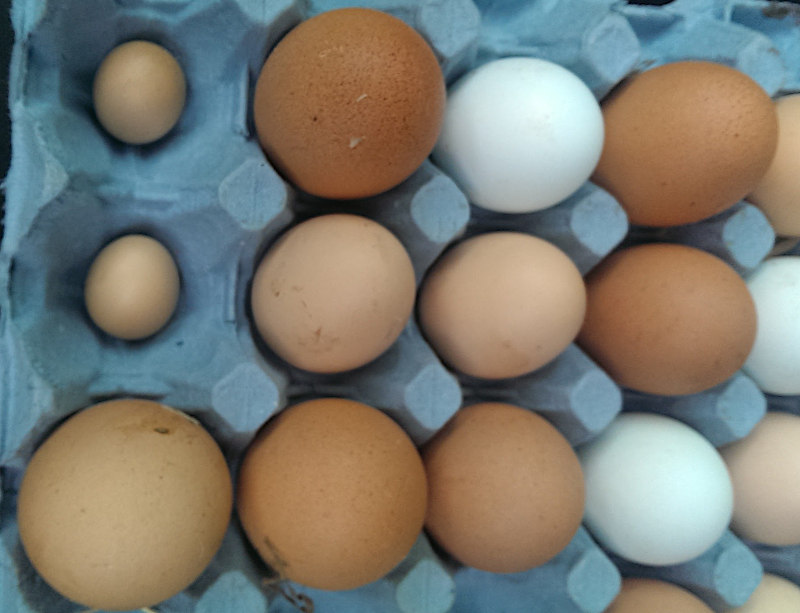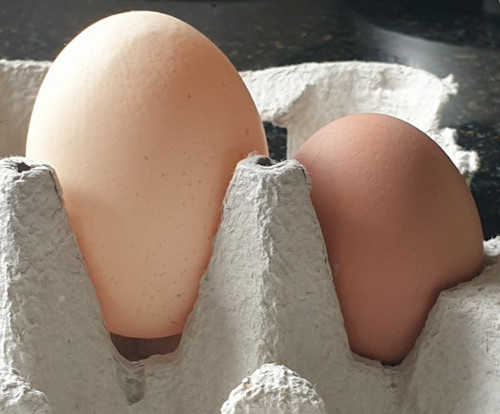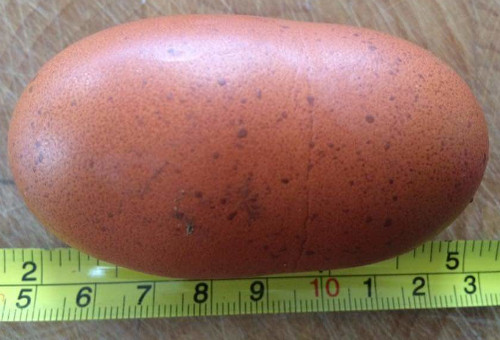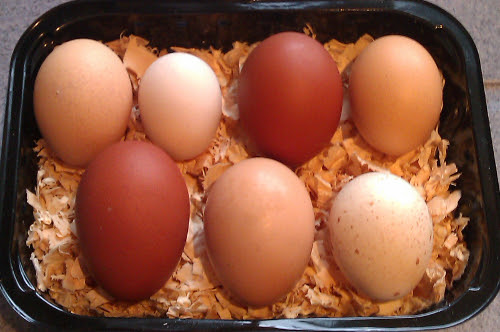Will my chickens eggs get bigger?

If you have just got your chickens and been disappointed at the size of the first few eggs you need not be too worried.
You can see from the header image above that it happens to most keepers at some point.
While there is a few reasons chickens lay small or undersized eggs, they are not common and the likelihood is your flock will soon be laying big eggs.
Will my chickens eggs get bigger?
Up to a point your chickens eggs will get bigger over time. Initailly it happens quickly when the hen starts laying and then it may take several years for hens to lay very big eggs.
Below: A big egg next to a normal sized one.

The older your chickens get, the larger their eggs will be. Older hens eggs get bigger and they lay more regularly.
It normally takes a few weeks for a chickens egg producing machinery to settle down after the first start laying.
Why are my chickens eggs so small?
A chickens eggs are undersized for three reasons:
- They are a young bird that has yet to start laying properly.
- They are undernourished.
- One of their parents was a bantam and the egg size genes have been passed on.
- She is producing eggs without a yolk or white.
- The hens are stressed by overcrowding or predators visiting at night.
- Very early season or short day eggs.
Young birds is the most common reason for small eggs and the cure is time and good feed.
Improperly fed chickens will lay smaller eggs less often and the solution is to make sure at least 65% of their diet is a fresh quality pelleted feed for layer hens.
Genes play an important part in eggs size and larger eggs can be selected for in breeding programs. I, once, by accident produced a cross with a bantam hen and a full sized cockerel. The result was three quarter sized hens that produced tiny eggs for their size.
Hens can produce eggs without yolks or whites, sometimes only the odd one but occasionally a defect in the egg producing organs condemns them to always producing little eggs.
Below: Two eggs coming together in the egg tube can form a huge one.

Stress can cause hens to abort eggs in production and the result can be small eggs. The cure is to make sure your flock has enough room and is not being bothered by predators visiting at night.
Sometimes the first few eggs a chickens lays in the new season when the days are very short may be quite small.
Do chickens eggs get bigger over time?
Yes. All chickens eggs gradually get bigger as the hens gets older. By the time a hen is in her third season she may lay some real whoppers.
Hens laying small eggs has several causes depending on the circumstances.
Does egg size depend on the breed of chicken?
Egg size is breed dependant in the majority of cases but there are exceptions to the rule.
Hybrids are bred to be smaller and lighter birds and yet they lay some of the largest eggs while Orpington are a substantial size and yet a lay a normal sized egg.
Below: A selection of eggs from different breeds of chicken.

Jersey Giants and Brahma are enormous chickens relatively speaking and they lay a normal sized egg.
Are large eggs bad for chickens?
Large eggs above a certain size may cause internal damage in your hens and may get stuck (egg binding), cause burst blood vessels or tearing.
How long until chickens lay full size eggs?
Hens that have just begun to lay will start laying full sized eggs within six weeks.
If it was a food or stress issue causing the small eggs they will return to normal within a few days of you correcting the problem
How do I get my chickens to lay bigger eggs?
Chicken keepers can adjust or manipulate egg size by 5% by changing the hens' feed or environment.
As a rule, egg size correlates with hens' age and any effort to make your eggs bigger will likely not even be noticed.
Food has a small effect on the size of the eggs chickens produce. Certain proteins like Methionine can effect the size of the egg but only by small amounts.
Do eggs get bigger before hatching?
The size of an egg does not change after it has been laid. Eggs will be the same size during all stages of incubation and do not get bigger or smaller before hatching.
